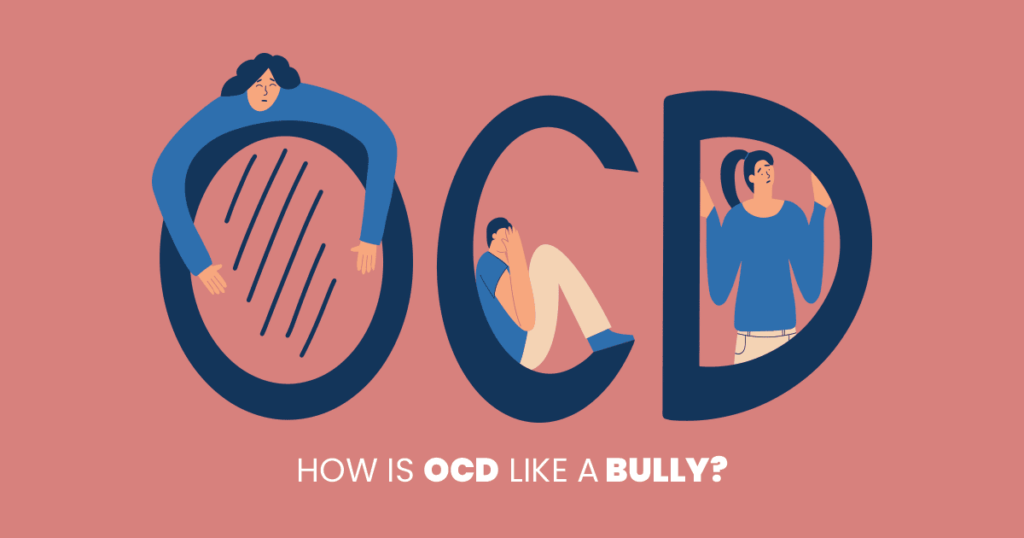Sometimes you’ll hear people with obsessive-compulsive disorder describe it as being like a bully that lives within them. The bully that is OCD can control and dictate every part of a person’s life, causing them extreme distress, interfering with functionality, and impacting their quality of life.
Symptoms of OCD can appear to resemble symptoms of anxiety disorders, post-traumatic stress disorder (PTSD), traumatic experiences, and other mental health disorders.
So how is OCD like a bully? Let’s talk about it.
What is OCD?
Obsessive-compulsive disorder, also written as “OCD”, is a mental health issue where someone experiences recurring, unwanted thoughts and ideas, which are obsessions. The obsessions drive them to engage in repetitive behaviors, known as compulsions.
The compulsive behavior interferes with a person’s life and social interactions significantly.
Of course, plenty of people experiences distressing thoughts or repetitive behaviors. Most of us do from time to time. That doesn’t mean we have OCD because these aren’t things that consistently disrupt our daily lives.
- The thoughts are persistent for people with OCD, and their behaviors are rigid.
- If you have OCD, not performing your compulsions in response to your obsessions is very distressing.
- In most cases, people with OCD know their obsessions aren’t realistic, but they can’t stop the behaviors or the obsessive thoughts.
- For a diagnosis of OCD, the obsessions and compulsions must be time-consuming. That means they take up more than an hour a day of the person’s time. They cause problems at work or socially and significant distress.
- An estimated 2-3% of people in the U.S. are affected by OCD, including slightly more women than men.
- Mental health disorders often begin in childhood, adolescence, or early adulthood. The average age symptoms start to occur is 19.
Understanding Obsessions
An obsession can be an image, thought, or impulse that creates uncomfortable, distressing emotions. For example, obsessions can cause people with OCD to feel disgusted or anxious. Someone with OCD likely realizes their obsessions are unreasonable or excessive, but they can’t stop the distress by reasoning their way out of it.
The compulsions are a way to deal with the negative feelings of the obsessions.
Examples of obsessions can include a fear of losing something important, a fear of contamination, or disturbing sexual images or thoughts.
Compulsions
A compulsion is a repetitive behavior or, in some cases, a mental act. Someone with OCD will perform a compulsion in response to an obsession to try and reduce or eliminate their distress.
Examples of compulsions can include excessive handwashing or showering, repeatedly cleaning a household object, or ordering and arranging things in a certain way.
How Is OCD Like a Bully?
When someone has OCD, they often share that it’s like a bully that follows them constantly. That could be a schoolyard bully, or there are often comparisons between OCD and workplace bullying.
You can realize when you have OCD that your thoughts aren’t logical, rational, or rooted in reality. That can often create more frustration and more of the sense that you’re dealing with a bully.
- The thoughts you experience resulting from the mental health condition are incredibly disturbing and intrusive.
- Then this triggers a cycle where you constantly worry about things not being done perfectly.
- Many people feel the obsessive, intrusive nature of their thoughts when OCD is like being tortured.
- You can also feel forced to spend the majority of your time on your compulsions, repeating them over and over again. The obsessions and compulsions take over your life, so it’s like someone else is dictating your every move.
- You are thinking things that you don’t like, don’t find appealing, and find repulsive in many cases.
- You’re compelled to keep up the rituals and behaviors, no matter how illogical you recognize them as being.
- Your brain is tricking you into believing certain thoughts are bad and that you should keep focusing on them. With OCD, your brain is also playing tricks on you because you think you have to keep doing rituals.
- If you don’t listen to this bully in your head, you can start to panic. You’re filled with what-ifs. For example, what if you don’t wash your hands and someone gets sick?
When dealing with a bully in real life, giving in rarely fixes the problem. Instead, it makes it worse. When you give the bully what he wants, he’s empowered. He’ll continue to target you, knowing the outcome. Often, the bully’s demands on you get worse each time you give in.
- OCD can be the same. When you give in to your obsessions and compulsions, you temporarily feel a flood of relief, just like you would if you handed over your lunch money to a schoolyard bully.
- Unfortunately, you realize the bully is never satisfied with this approach.
- You can fear that if you don’t listen to the bully or do what it wants, bad things will happen.
When you frame your OCD as a bully, you can take steps to externalize the disorder and your thoughts and compulsions. When you can externalize them, rather than making them part of your identity, you can begin to take positive steps toward getting help.
Often when you work with a therapist, they’ll help you understand that everyone has thousands of thoughts and that there’s no need to dwell on any one irrelevant thought as being terrible. You also learn through therapy and treatment that having a thought doesn’t mean you’re going to act on it.
Seeking Treatment for OCD in San Diego
Above, we talk about how a therapist may work with you to help you see OCD more externally, much like you would a bully. It’s not easy to tell a bully no, nor is it easy to do this with OCD. However, when you do, even though it takes courage and practice, you’re going to start being more and more empowered.
With OCD, you’ll first have to identify the bully. That means you’ll begin to assess your obsessive thoughts and their irrationality. You can’t overcome what you don’t first identify. You can also start to be mindful of how you feel physically when you’re experiencing bullying thoughts.
From there, you’ll remember that temporarily giving in to a bully may give you short-term peace but long-term torment. You have to stand up to the bully.
You may engage in something called Exposure and Response Prevention Therapy (ERP) in therapy. ERP is a very common behavioral therapy approach for OCD.
You might also participate in cognitive behavioral therapy (CBT).
If you’re ready to confront the bully that is OCD, please reach out to the Mental Health Center of San Diego by calling (858) 258-9883 today.




















